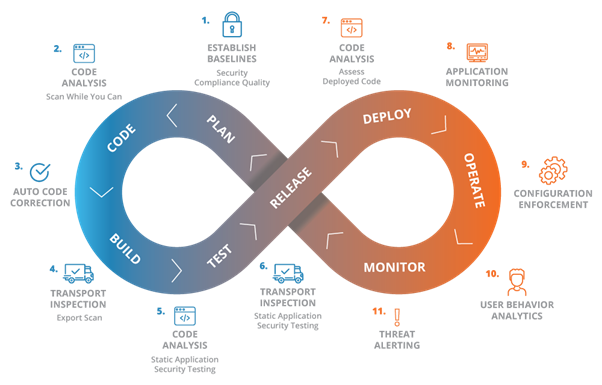Introduction
DevSecOps is a methodology that combines Development, Security, and Operations to enable organizations to build secure and reliable software products. It provides a comprehensive approach to software development that integrates security into every stage of the software development lifecycle. This approach ensures that security is a top priority, and potential vulnerabilities are identified and addressed early in the development process.
The key principles of DevSecOps: Automation, Collaboration, and Security are critical to the success of DevSecOps and enable organizations to build secure, reliable, and scalable software products. In this blog post, we will discuss how each principle contributes to the overall success of DevSecOps and how organizations can implement them in their software development process. By understanding the key principles of DevSecOps, organizations can build software products that are more secure and resilient to potential security threats.

Automation
Automation is at the heart of DevOps and DevSecOps. By automating manual tasks and processes, organizations can increase efficiency, reduce errors, and accelerate software delivery. This includes automating everything from code testing and deployment to security testing and monitoring. Automation also enables teams to focus on high-value tasks, such as innovation and improving user experience.
In the context of security, automation can help to identify potential vulnerabilities early in the development process, ensuring that security risks are addressed before they become a problem. Automation can also be used to continuously monitor systems and applications for security threats and respond to incidents in real time.
Collaboration
Collaboration is another key principle of DevSecOps. In traditional software development, development and operations teams often work in silos, leading to communication breakdowns and delays. DevOps and DevSecOps seek to break down these barriers and foster collaboration between all teams involved in the development process.
By working together, teams can share knowledge, identify potential issues earlier, and resolve problems more quickly. Collaboration also helps to ensure that everyone involved in the development process has a shared understanding of security risks and is committed to addressing them.
Security
Security is the third and most critical principle of DevSecOps. As the frequency and severity of cyber-attacks have increased, organizations must ensure that their software is secure. This means that security must be considered at every stage of the development process, from design and development to testing and deployment.
Security testing and monitoring must also be automated and integrated into the development process. This includes using tools such as static and dynamic code analysis, vulnerability scanning, and intrusion detection to identify potential security threats. DevSecOps also requires a culture of continuous improvement, where security risks are identified and addressed in real-time, rather than being left to be dealt with later.
Conclusion
In conclusion, the principles of DevSecOps – automation, collaboration, and security – are crucial for organizations looking to develop, deploy and maintain secure and reliable software products. Automation helps to streamline and speed up the development process, while collaboration ensures that everyone involved in the process is working towards the same goal. Finally, security ensures that the end product is secure and protected from cyber attacks.
By implementing these principles, organizations can reduce the risk of security breaches, improve the quality of their software products, and increase the speed of their development cycles. DevSecOps represents a significant shift in software development culture, emphasizing the importance of security at every stage of the development lifecycle. It is an approach that offers a proactive and collaborative approach to security, where everyone involved in the process takes responsibility for ensuring the security of the final product.
Ultimately, the success of DevSecOps depends on a cultural shift towards a security-first mindset, where security is integrated into every aspect of software development.
Thanks for reading!
Subscribe to our RSS feed